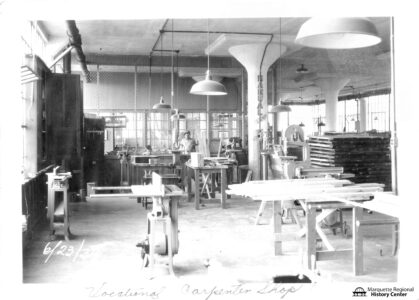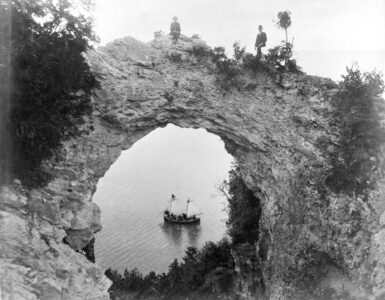It was quite a week! (Part 1)

Abbie Hoffman
By JOHN CEBALO
Marquette Regional
History Center
Special to the Journal
MARQUETTE — There was one week in May 1972, the week prior to the Democratic Presidential primary election, when four figures of national political significance converged on the city of Marquette. Three of them were politicians: a former vice president, a future vice president, and a notorious southern governor; while the fourth was an equally notorious figure in “The Movement.”

George Wallace
The last two added seasoning to what otherwise could have been just another bland political dish.
At the same time, on the other side, President Nixon was running for reelection on the Republican ticket. But the primary, the state’s first in 44 years, was an open primary, which meant that Republicans were free to skip their primary and vote in the Democratic one
Across the nation anti-war demonstrations were breaking out, the North Vietnamese were on the offensive, and President Nixon had just ordered the bombing of Hanoi and the mining of Haiphong.
On Wednesday morning, May 10, Gov. George Wallace of Alabama, was the first to arrive, fresh from a large rally in Dearborn the night before. More than 200 local supporters met him and his wife at the airport. He shook hands with the mayors of Marquette and Ishpeming, and then left to tape an interview at WLUC.
Gov. Wallace had previously run for president as a candidate of the American Independent Party in 1968, and he had captured five states as well as 10 percent of the Michigan vote.
He was best known for his 1962 declaration: “Segregation now. Segregation tomorrow. Segregation forever.”
A recent winner of the Florida primary, and the favorite to win the Michigan primary, he was especially vocal in attacking a Virginia federal court decision which had ordered that busing be used, if necessary, to desegregate the schools in that state .
From the TV studio Wallace traveled to the Holiday Inn for lunch, and then he went to Shopko, where, in the front parking lot, he climbed aboard the flatbed of a truck and spoke from behind a lectern.
The platform was surrounded by city police facing outward. It was a beautiful day, with sunny skies and temperatures in the upper 60s.
Among the 4,000 spectators were 20 national correspondents who were covering his campaign. While he was occasionally heckled, the audience was generally friendly — or at least curious. Meanwhile, a traffic jam developed out on West Washington Street.
Wallace predictably returned to his attack on the Virginia desegregation decision, calling it “callous, asinine, ludicrous, senseless.” He denied the charges that he was racist, stating, “You who have traveled with me know I don’t have a bit more racism in my heart any more than you.” He criticized Nixon’s handling of the Vietnam War, but was also strongly opposed to those protesting the war, stating, “”The liberals got us into this war and brought us no peace …”
The anti-war protesters that Wallace denounced were well-represented at another rally that same day. That evening Abbie Hoffman appeared before a crowd of 2,000 in Hedgcock Fieldhouse.
Hoffman, age 36, was a flamboyant political activist. In 1967, during The March on The Pentagon, he had threatened to levitate that structure.
Later that year he cofounded the Youth International Party (YIPPIES). In 1968 he was a defendant in the Chicago Eight Trial, which was triggered by his actions during the Democratic Convention in Chicago.
In Hedgecock Hoffman told the audience that 200,000 protesters were expected in Miami for the upcoming Democratic Convention. He urged them to attend the convention, likened Nixon to Hitler, and attacked the news media: “…news is gossip.” And he told them not to believe the “…phony differences between students and labor.” Despite comparing Nixon to Hitler, he reserved much of his wrath for the Democrats, calling Hubert Humphrey “an opportunist and a jelly fish. Dump the Hump.” He continued his provocative remarks with comments such as “We will be advocating peace and non-violence tactics [at the convention]….do good and have fun …there is a time and place for everything -a right rock, a right time, a right window.”
Afterwards, sitting on the grass in front of Kaye Hall there was a rap session.
Question: “Is the system worth saving?”
“No. But the country is — the system will crumble anyway…food clothing and shelter should be given to all people.”
Question: “Will the revolution against corporate industry continue until industries crumble?”
“Yes… there will be a new concept of work.”
Question: “Will people work for each other after we destroy industry?”
“Yes. I hope so…”
The next day a bomb threat emptied Kaye Hall.
Next week’s article will recount the other famous visitors to Marquette in the week preceding Michigan’s May 1972 Presidential Primary.
- Abbie Hoffman
- George Wallace






